Life is definitely not fair. This is a well-known fact. You probably heard an adult tell you this when you were a kid. Things very often do not turn out the way we planned or hoped. Often times, we must develop an alternate plan or goals for ourselves.
Food for your Mood: Chocolate
There are studies done on a myriad of subjects, but my personal favorites support consuming chocolate as a way to elevate one’s mood. J.K. Rowling had it right when she wrote about chocolate as the best remedy when attacked by a dementor.
Your Thyroid, Depression, and Anxiety: The Connection You Never Knew
The thyroid gland is a butterfly-shaped gland that wraps around the trachea and is positioned near the larynx (or voice box) in the throat. This gland produces two hormones: thyroxine, or T4, and triiodothyronine, known as T3. It is responsible for some very important functions in your body, such as regulating body temperature, maintaining proper heartbeat, and ensuring adequate cognitive function.
Surviving the Quarter Life Crisis: How To Make It Out Alive
If you read Part 1 of this series, you are now aware that the quarter-life crisis is in fact a very real thing that affects many people in their 20’s and early 30’s. While there may not be an exact “cure” for the quarter-life crisis, here are a few tips to help you keep your head above water and make this a successful time in your life.
New Year’s Resolution: Two Steps Forward or One Step Back?
January is almost half over. How are you doing on your New Year’s resolutions? If you’re like most people, you’re probably feeling like you took two steps forward and one step back. You decided to make positive changes in the New Year and within a few days or even hours, you slip up and revert to your old way of doing things.
Understanding Tinnitus: Treatment Options (Part 4)
Now that you understand what tinnitus is, you might be thinking, “What can I do if I have tinnitus?” or “How can therapy be helpful with the symptoms I am experiencing?” Today I hope to give you an idea of the treatment options that are available for someone who might be suffering from tinnitus.
Understanding Your Teen: Today’s Marijuana
Studies are showing that marijuana use is becoming more prevalent in teens and that this use can cause lasting damage. Here’s what you need to know.
Community Trauma: How the Events in Ferguson Touch Us All
The events in Ferguson are traumatic not only for his family but for the community at large. It’s important to recognize the effect it can have on all of us.
Shame or Guilt: The Effects
In the first part of this series, we talked about distinguishing the differences between true guilt, false guilt, and shame. Now, let’s look at the effects of shame and guilt and how to overcome them.
Shame or Guilt: What Is The Difference?
Many people say they feel guilty about various things they have said or done in the past. They may even feel guilty when saying ‘no’ or standing up for themselves. There are misconceptions between what is actual guilt and what is false guilt. Furthermore, what someone may actually be feeling is actually shame.

